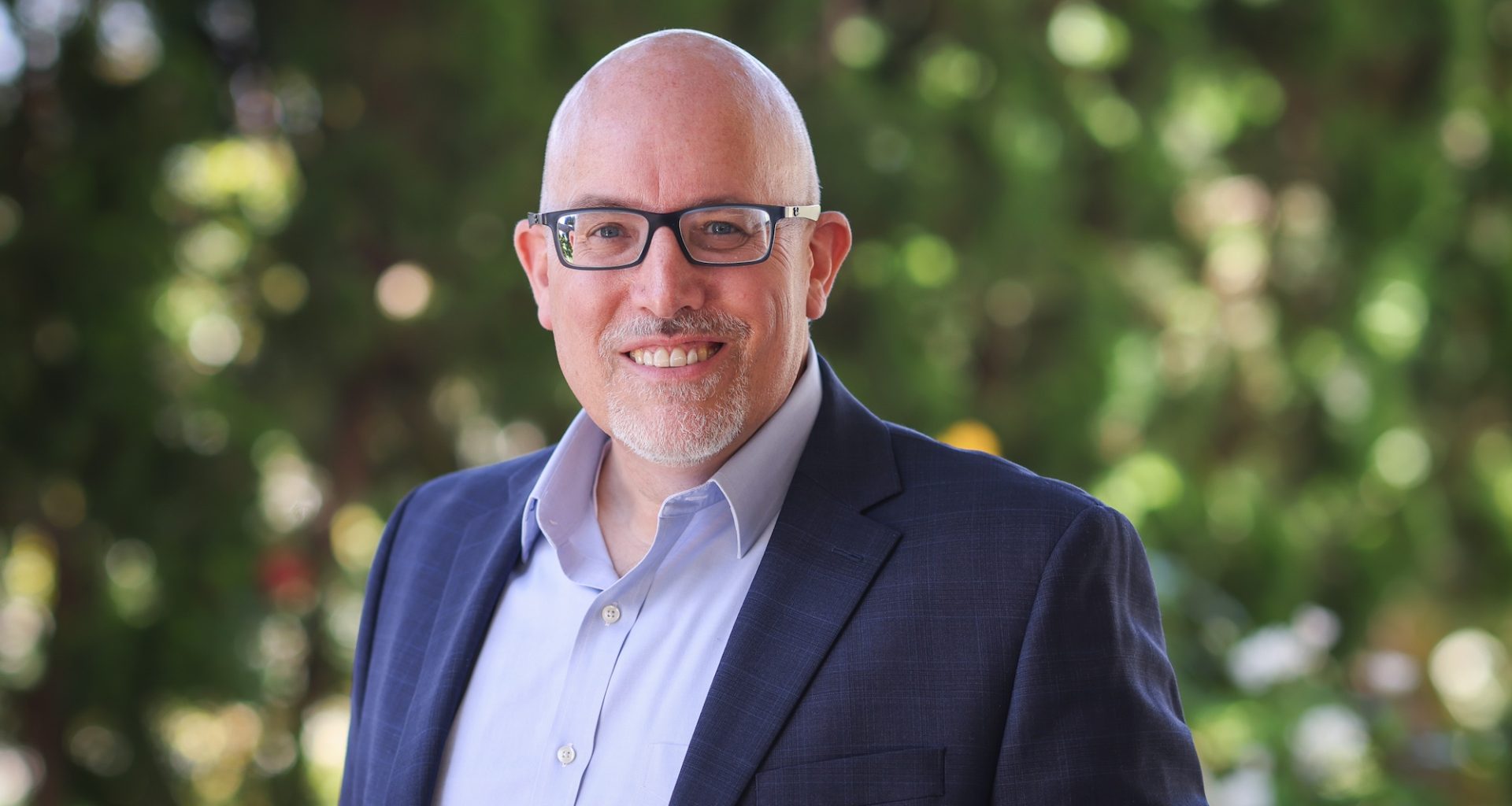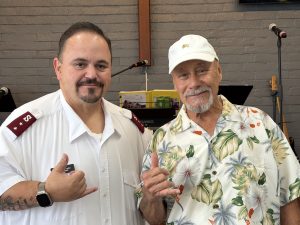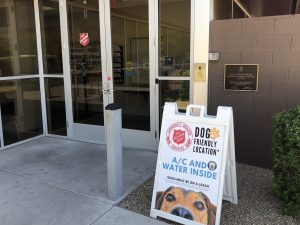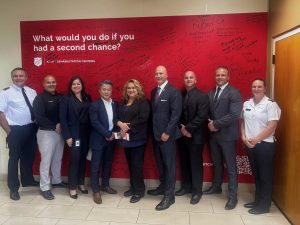Christopher Hogan returns to the Western Territory after 16 years.
Christopher Hogan says he’s come home.
“I can’t wait to get started,” he said of his new role as Western Territorial Social Services Director. “This is a dream position for me. It doesn’t feel like work.”
Hogan left the department he now leads 16 years ago, when he was Management and Program Consultant. His wife had received a job promotion that required a move to the East Coast.
“Sixteen years ago, I supported my wife’s career promotion,” he said. “And you know what? Sixteen years later, the Lord blessed us, and she supported mine.”
Despite sharing a name, Hogan is not related to Commissioner Colleen Hogan Riley, Territorial President of Women’s Ministries and Territorial Secretary for Spiritual Life Development.
“The very first time I met the Commissioner, I said, ‘We’re family,” Hogan said. “I don’t know where or how many hundreds of years to go back, but you’re family to me.”
Hogan began his career in 1993 after receiving a master’s degree in Social Work from Boston College. For the next two years he worked in Boston as a clinical social worker. During this time, he said he realized his gifts were in administration.
In 1995, he was able to act upon that realization—along with fulfilling a longtime desire to live in San Diego—when he became Assistant Administrator of Social Services for the then Sierra del Mar Division. It was his introduction to The Salvation Army, an organization he’s since remained connected with as both an employee and a consultant.
“I’m here to roll up my sleeves and serve. Whatever that looks like.”
Christopher Hogan
In San Diego, Hogan worked with then director Bill Molina, who he said is one of his greatest mentors.
“Probably the second week of my employment, he said, ‘Chris, you cannot put your ego and the Lord Jesus Christ on the same pedestal,’” Hogan said. “And I have tried to carry that humble leadership, always realizing that I am here as God’s servant, and that God is working through me. It is not about me at all. It’s about how I can serve God’s greater kingdom.”
After moving in 2008, Hogan formed his own consulting firm, and from 2008–2019, his clients included Salvation Army social service departments from all four U.S. territories. He then spent five years in the Southern Territory as Territorial Training and Evaluation Director.
“We are excited to have Chris join our team to lead our social services ministry throughout the Western Territory,” said Territorial Secretary for Program Lt. Colonel Phil Lum. “He brings with him a wealth of experience and a deep passion for fulfilling our mission.”
Caring Magazine spoke with Hogan to learn more about his vision and the work ahead.
You’ve had a number of roles with The Salvation Army. What keeps you coming back?
It’s a deep love of the holistic, integrated mission of The Salvation Army. It’s exciting to be able to express my faith and to be in an organization where we recognize that we’re not here just to meet human need, but we’re here to also preach the gospel and to meet the spiritual needs of the individual. To have an opportunity to bring both of those together on the ground is incredibly meaningful to me.
What is the most pressing need in the Western Territory?
The biggest one, I think, is affordable housing. Forty-four percent of Americans are not earning a livable wage. And 26 percent of families are spending more than 50 percent of their income on rent. No wonder they’re coming to our doors asking for assistance and support.
You’re in your first months in this role—as you said, “in a time of listening.” With that said, what’s next?
Next is building partnerships at the territorial, divisional and field levels…If we look across the territory, there’s amazing work happening in each division. But have we been able to figure out how to take best practices that exist in this division, and share them with another division? It’s about getting all of us to work as one Army…And to develop that collective vision, we’ve got to convene. We’ve got to think big together, and to make decisions together.
What is your philosophy of social service work?
What we need to do, not only in the West, but across the United States is to create programs of excellence…We want to have a deep impact on the life of a person. When we do that, a couple of things happen. First, that individual is more open. Because we’ve created an atmosphere of trust, maybe they’re more willing to engage in their own spiritual growth and development. Furthermore, we’re creating centers of excellence because it’s going to lead to increased fundraising, increased community impact, increased opportunities for community collaboration. And it’s incredibly important that we remain relevant as a social services organization, that we provide the highest level of social services that we can, and I’m deeply committed to doing that.
How would you describe your leadership style?
I’m a servant leader—I want to lead from the heart. Most people say that’s not a winning strategy. I think it is. If you invest in people, you care for people, you support people, you encourage people. Amazing things happen when you create an atmosphere of appreciation and gratitude. It’s tangible; you can feel it. It’s built on spiritual principles.
That doesn’t mean we’re not going to be strategic. I just think that we need to be heart-centered, because the work on the ground is heart-centered. And so we need to match our leadership to do that, because the work of the field is heavy. And it’s challenging. I want to be clear that strategy is critical. But that’s not what we lead from.
If we can create environments of care at all levels of the organization, amazing things will happen.
What else would you like people to know?
I’m here to roll up my sleeves and serve. Whatever that looks like. Whether it means coming alongside a corps officer and giving them a policy and procedure manual, whether it’s with a caseworker in an office offering an encouraging word, whether it’s partnering with a director, a division, a new program—I just want to serve. I want to serve and support the field in any way it needs, and I want to work in partnership to really continue to strengthen social services ministries.
I’m deeply passionate about this work. For me, this is a ministry. And I feel a tremendous amount of responsibility that’s been placed upon me. I know every day that I need to surrender this work to God, because it’s being used for his purpose. If I work hard and be faithful, I’ll be shown the way.
Do Good:
- Did you know The Salvation Army served some 24 million Americans last year fighting hunger, homelessness, substance abuse and more? Where can you help? Take our quiz to find your cause and learn how you can join in today.












